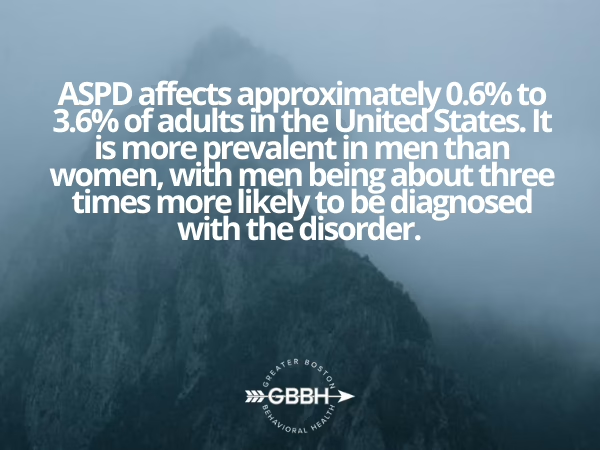Antisocial Personality Disorder (ASPD) is a serious mental health condition characterized by a pervasive pattern of disregard for the rights of others. Individuals with ASPD often engage in manipulative, deceitful, and harmful behaviors that can significantly impact their relationships and overall quality of life. At Greater Boston Behavioral Health, we offer various Mental Health Programs to help individuals navigate their mental health challenges, including ASPD. If you suspect you may have this disorder, understanding the signs and seeking professional help is crucial.
Understanding Antisocial Personality Disorder
ASPD typically emerges in late adolescence or early adulthood, and its symptoms can persist throughout a person’s life. It’s important to recognize that ASPD is more than just a set of behaviors; it involves complex emotional and psychological dynamics. While many may exhibit occasional selfish or reckless behaviors, individuals with ASPD display these traits consistently and to a degree that disrupts their lives and the lives of others.
Common Misconceptions About ASPD
Before delving deeper into the signs and symptoms, it’s important to address some misconceptions surrounding ASPD:
- Myth 1: ASPD is the same as being a criminal. While individuals with ASPD may engage in criminal behavior, not everyone with the disorder is a criminal. Many people with ASPD function in society without breaking the law, although their interpersonal relationships may be strained.
- Myth 2: People with ASPD can’t change. While ASPD is a challenging disorder to treat, with the right interventions and support, individuals can learn to manage their symptoms and improve their relationships.
- Myth 3: ASPD is the same as sociopathy or psychopathy. Although these terms are often used interchangeably, they can denote different subsets of antisocial behavior. ASPD is a clinical diagnosis, while sociopathy and psychopathy are often considered to fall along a spectrum of antisocial behaviors.
Recognizing the Signs of Antisocial Personality Disorder
Identifying ASPD can be challenging, as symptoms often manifest in various ways. Here are some common signs to consider:
- Chronic Disregard for Rules:
- Individuals with ASPD frequently ignore societal norms and laws. This disregard may result in repeated legal troubles, such as arrests for theft, assault, or other criminal activities. Their impulsive actions often come without consideration for the potential consequences, leading to a cycle of risky behavior.
- Lack of Empathy:
- A significant characteristic of ASPD is a diminished ability to empathize with others. This may lead to manipulation or exploitation for personal gain without experiencing remorse. Individuals often rationalize their actions and may not comprehend the emotional impact of their behavior on others.
- Deceitfulness:
- A pattern of lying, conning, or using aliases is common among those with ASPD. They may manipulate situations to achieve their goals, often without regard for truth or others’ feelings. This deceit can damage relationships and erode trust with friends, family, and colleagues.
- Impulsivity:
- Impulsive behavior is another hallmark of ASPD. Individuals may engage in reckless decisions, such as substance abuse or dangerous driving. This impulsivity often leads to unstable personal and professional relationships, as they struggle to maintain commitments and responsibilities.
- Irritability and Aggressiveness:
- Frequent displays of irritability or aggression, including physical fights or assaults, are common. This aggressive behavior often arises from perceived slights or frustrations, revealing an inability to manage emotions effectively.
- Superficial Relationships:
- Relationships may be shallow and superficial, as individuals with ASPD often lack genuine emotional connections. They may appear charming or charismatic but struggle to form meaningful bonds, leaving them isolated and unfulfilled.
Assessing Your Mental Health
If you recognize several of these traits in yourself, seeking a professional evaluation can be a crucial step. A mental health professional can conduct a comprehensive assessment to determine if you meet the criteria for Antisocial Personality Disorder. This assessment typically includes:
- Clinical Interviews: In-depth discussions about your personal history, behaviors, and feelings can help clinicians understand your experiences and challenges.
- Psychological Testing: Standardized questionnaires and assessments can evaluate personality traits and behavioral patterns, providing valuable insights into your mental health.
- Behavioral Observations: Mental health professionals may observe your interactions to gather information about your behaviors and social dynamics.
Exploring Underlying Factors
Understanding the context of ASPD is essential. Many individuals with ASPD may have experienced adverse childhood events, such as trauma or neglect, which can contribute to the development of the disorder. Recognizing these underlying factors can inform treatment approaches and help individuals work through past experiences that influence their current behaviors.
The Importance of Self-Reflection
If you find yourself resonating with several of these traits, it may be helpful to engage in self-reflection. Consider your past relationships and behaviors, asking yourself questions such as:
- Do I often feel misunderstood or disconnected from others?
- Have my actions hurt people I care about, and how do I feel about it?
- Am I frequently bored or seeking excitement, leading to impulsive decisions?
These reflections can provide valuable insights into your mental health and prompt you to seek further evaluation.
Seeking Help: Treatment Options for ASPD
While ASPD can be challenging to treat, several approaches may help individuals manage their symptoms and improve their quality of life. At Greater Boston Behavioral Health, we offer a range of Mental Health Treatment Programs designed to support individuals with various mental health conditions, including ASPD.
- Cognitive-Behavioral Therapy (CBT):
- CBT Therapy focuses on identifying and changing negative thought patterns and behaviors. By helping individuals understand the consequences of their actions, CBT empowers them to develop healthier coping mechanisms and more constructive behaviors.
- Dialectical Behavior Therapy (DBT):
- DBT Therapy combines cognitive-behavioral techniques with mindfulness practices. It is particularly effective in helping individuals manage intense emotions and improve interpersonal relationships, fostering better communication and emotional regulation.
- Acceptance and Commitment Therapy (ACT):
- Acceptance and Commitment Therapy encourages individuals to accept their thoughts and feelings rather than fighting against them. This approach promotes psychological flexibility and helps individuals commit to values-based actions, enhancing their overall well-being.
- Group Therapy Programs:
- Group therapy program provides a supportive environment where individuals can share experiences, learn from others, and develop social skills. This setting fosters accountability and understanding, allowing individuals to practice healthier interactions.
- Intensive Outpatient Program (IOP):
- For individuals needing more structured support, an IOP offers comprehensive treatment while allowing them to live at home. Intensive Outpatient Program includes regular therapy sessions, skills training, and opportunities for personal growth.
- Trauma Therapy Program and EMDR Therapy:
- Many individuals with ASPD have experienced trauma. Specialized trauma therapy, including Eye Movement Desensitization and Reprocessing (EMDR), can help individuals process and heal from past experiences, addressing the roots of their behavior.
The Role of Support Systems
Building a robust support system is essential for individuals with ASPD. Support from family, friends, and mental health professionals can foster positive change and provide encouragement throughout the recovery journey. Engaging in supportive communities, such as group therapy, can also enhance interpersonal skills and promote healthier relationships.
Conclusion
If you suspect you may have Antisocial Personality Disorder, it is vital to seek professional help. Early intervention can lead to better outcomes and improved relationships. At Greater Boston Behavioral Health, our Mental Health Treatment Center in Massachusetts is dedicated to providing compassionate and comprehensive care for individuals facing ASPD and other mental health challenges. By utilizing various therapeutic approaches, including CBT, DBT, ACT, and more, we aim to support your journey toward healing and personal growth. Call us at: (888)278-0716 today to know more.
Frequently Asked Questions (FAQ) About Antisocial Personality Disorder
What are the common signs and symptoms of ASPD?
Common signs include chronic disregard for rules, lack of empathy, deceitfulness, impulsivity, irritability, aggressiveness, and superficial relationships. Individuals may struggle to maintain meaningful connections and often engage in risky behaviors without considering the consequences.
How is ASPD diagnosed?
A mental health professional diagnoses ASPD through a comprehensive evaluation, including clinical interviews, psychological testing, and behavioral observations. They will assess your history of behaviors and emotional responses to determine if you meet the diagnostic criteria.
What causes Antisocial Personality Disorder?
The exact cause of ASPD is not fully understood, but a combination of genetic, environmental, and social factors can contribute. Many individuals with ASPD have experienced adverse childhood events, such as trauma, neglect, or abuse, which can influence the development of the disorder.
What treatment options are available for ASPD?
Treatment options include Cognitive-Behavioral Therapy (CBT), Dialectical Behavior Therapy (DBT), Acceptance and Commitment Therapy (ACT), and group therapy programs. At Greater Boston Behavioral Health, we provide a range of Mental Health Treatment Programs tailored to meet the needs of individuals with ASPD.
Can individuals with ASPD change their behavior?
With the right treatment and support, individuals with ASPD can learn to manage their symptoms and develop healthier coping mechanisms. Therapy can help them understand the consequences of their actions and work towards improving their interpersonal relationships.
Is ASPD treatable?
While ASPD can be challenging to treat, many individuals can achieve significant improvements in their behavior and quality of life through therapy and support. Early intervention and ongoing care are crucial for positive outcomes.


